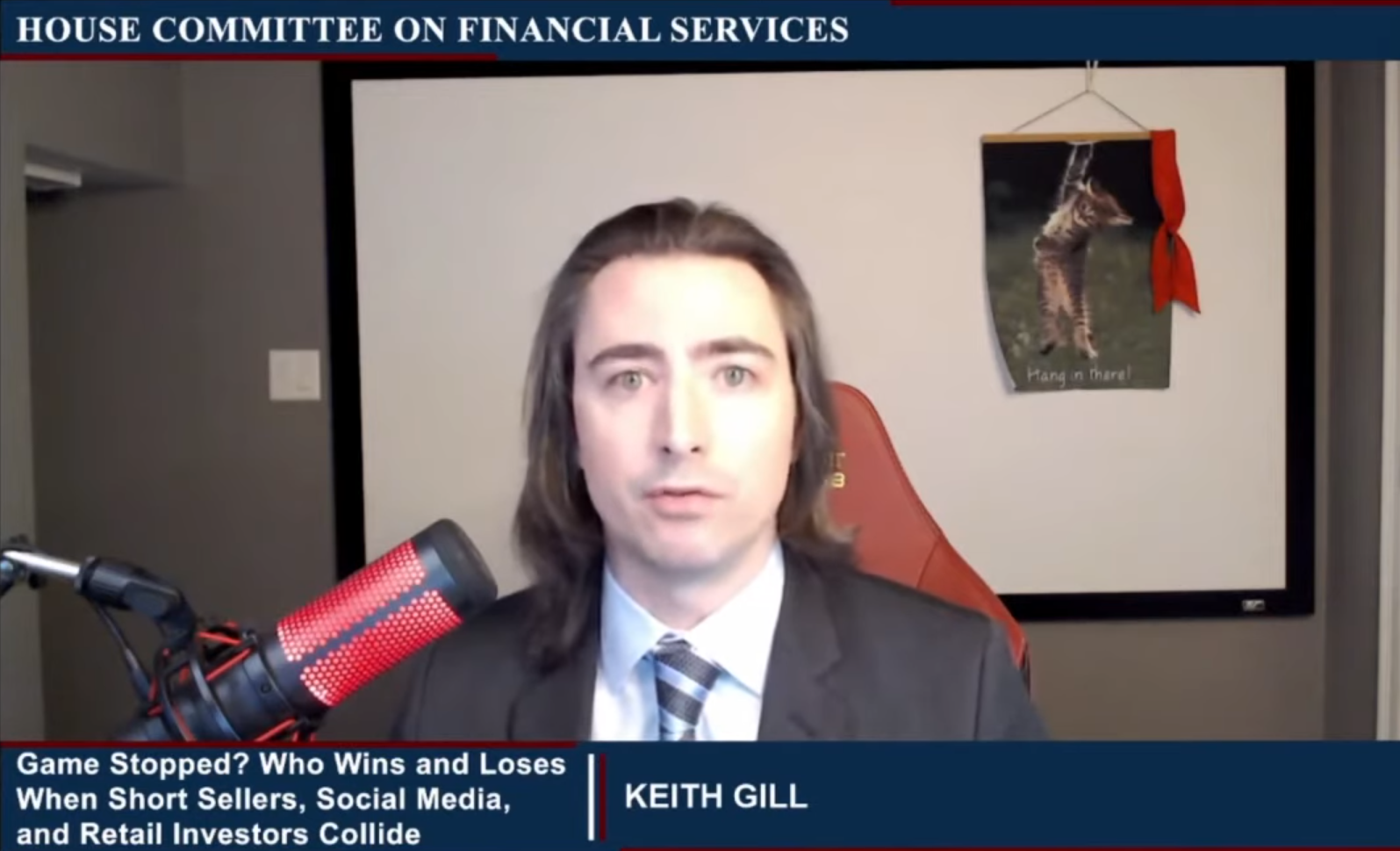Man credited with GameStop stock surge tells Congress 'even I barely understand these matters'
This was while sat in a gamer chair, with a picture of a cat saying "hang in there".

Last month, GameStop stock, partly inspired by the subreddit r/wallstreetbets and one user in particular, went on a wild ride into the stratosphere. What exactly was happening had everyone scrambling: Was this the victory of the little guy? The retail investors besting arrogant hedge funds? A temporary aberration? Was it even legal?
No one quite has all of those answers yet, though one thing for certain is that plenty of the 'little guys' lost a lot of money. And getting a little closer to what did happen was ostensibly the purpose of a US Congressional hearing that heard testimony from, among others, Keith Gill.
Gill, aka redditor u/deepfuckingvalue, aka financial YouTuber Roaring Kitty, was one of the biggest and most prominent early investors in GameStop before the huge spike in the company's stock price. Some say that his open advocacy of the stock, which hit a peak just below $500 in late January, is the prime factor behind whatever did happen.
A Congressional hearing is on the one hand serious business, but on the other a great opportunity to bust out some memes. Gill gave his testimony in front of an image of a cat hanging by a paw, accompanied by the words 'hang in there', adorned with a red bandana for some Rambo vibes. He also used a streamer mic and was seated in a gaming chair, specifically a Game of Thrones House Lannister-branded Secretlab Omega.

The gags didn't end there. One of the questions raised by some about Gill's role in this affair is whether the ability of a single investor to recommend a stock they're invested in, and precipitate this kind of internet reaction, is legal or counts as market manipulation.
"A few things I am not," says Gill. "I am not a cat. I am not an institutional investor, nor am I a hedge fund. I do not have clients and I do not provide personalized investment advice for fees or commissions. I’m just an individual whose investment in GameStop and posts on social media were based upon my own research and analysis."
The below clip begins at another highlight, as Gill is asked by Representative Bill Huizenga "you recommended GameStop before, would you recommend GameStop now? [...] Are you buying that stock today?"
The biggest gaming news, reviews and hardware deals
Keep up to date with the most important stories and the best deals, as picked by the PC Gamer team.
"Well, let me just say that investing can be risky," says Gill, "and my particular approach to investing is aggressive and may not be suitable for anyone else, but for me, yes."
Huizenga can only laugh, and is so taken aback he asks whether it's a yes or no.
"For me personally," emphasises Gill, "yes I do find it an attractive investment at this price point."
Gill's bullishness caused a minor spike in GameStop's stock price, though this time it lasted all of half an hour.
...and that's back down $GME pic.twitter.com/6LUEta6L9UFebruary 18, 2021
One major theme of the hearing was the CEO of investing app Robinhood, Vladimir Tenev, taking a bit of a kicking from representatives about things like why it's not a public company itself, the temporary barring of GameStop stock buying on his platform, and so on. But what the politicians seemed most interested in finding out about Gill was whether he'd discovered One Weird Trick To Bamboozle The Stock Market.
Representative Blaine Luetkemeyer asked Gill whether he'd put his success down to "outsmarting" the system in some way, to which Gill responded: "I would say my expertise is in analysing the business, the fundamentals of the business, not so much the inner workings of the market..."
Gill had earlier in the hearing spoke about those fundamentals: "I grew up playing videogames and shopping at GameStop, and I plan to continue shopping there [...] GameStop stores still provide real value to consumers and reliable revenue to GameStop."
His written evidence provides the timeline of his own investments: "In early June of 2019, the price of GameStop's stock declined on worse than expected earnings, and it began trading at a deep discount, below what I thought was its fair value. I was aware from public reports that a well-known investor, Michael Burry, was interested in GameStop. Because I thought the stock was undervalued, I purchased call options on June 7, 2019. I increased my position throughout much of 2019 and 2020, because as I continued to analyze the company and its three prospects, I became increasingly confident that the share price was indeed dramatically undervalued."
Gill goes on to write that, in his opinion, "the market was underestimating the prospects of GameStop's legacy business and overestimating the likelihood of its going bankrupt."
The full hearing took over four hours, and no it's not worth watching the whole thing (but here it is). Towards the end Gill was asked whether, basically, he felt there was anything wrong in smaller investors banding together in this way using social media.
"I would be the first to say that investing in stocks is incredibly risky, and I would encourage people to do their own thorough research before investing," he said. "But that said I tend to agree with you Congressman, that folks should be able to freely express their views on a stock, and they should be free to buy that stock or not based on the views they have."
This hearing was the the first of what will be three Congressional hearings on what happened with GameStop's stocks in January. Perhaps the best summary of the situation so far comes from Gill's written submission to Congress:
"As for what happened in January, others will have to explain it. Threshold lists, order flow, halting purchases—according to the media these all had a material impact on GameStop stock in January. Here's the thing: I've had a bit of experience and even I barely understand these matters. It's alarming how little we know about the inner-workings of the market, and I am thankful that this Committee is examining what happened."

Rich is a games journalist with 15 years' experience, beginning his career on Edge magazine before working for a wide range of outlets, including Ars Technica, Eurogamer, GamesRadar+, Gamespot, the Guardian, IGN, the New Statesman, Polygon, and Vice. He was the editor of Kotaku UK, the UK arm of Kotaku, for three years before joining PC Gamer. He is the author of a Brief History of Video Games, a full history of the medium, which the Midwest Book Review described as "[a] must-read for serious minded game historians and curious video game connoisseurs alike."

